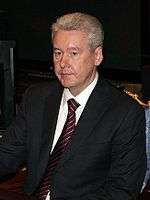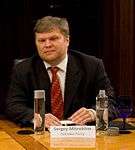Moscow mayoral election, 2013
| |||||||||||||||||||||||||||||||||||||||||||||
| Turnout | 32.3% | ||||||||||||||||||||||||||||||||||||||||||||
| |||||||||||||||||||||||||||||||||||||||||||||
| |||||||||||||||||||||||||||||||||||||||||||||
The Moscow mayoral election of 2013 was held on September 8, 2013, as part of the regional elections, at the same time as the elections in Moscow Oblast and other Oblasts were held.
Elections were held after Mayor Sergey Sobyanin had announced his departure on June 4. The elections were the first time in 10 years that citizens of the federal city of Moscow could choose their mayor by a popular vote.[1]
Moscow is both a city and separate federal subject, according to the Constitution of Russia.[2] Most of federal subjects are headed by governors or presidents, but the office of the head of Moscow is called Mayor of Moscow, according to the Charter of the city of Moscow.[3] Sergey Sobyanin won with 51.37% of the vote in the first round, with Alexei Navalny receiving 27.24% of the vote, significantly more than previously expected by the polls. Sobyanin was declared the winner after the first round. Voter turnout was 33.23%.[4] The total number of registered voters was 7,176,568.[5]
Background
The position of Mayor of Moscow was elected between 1991 and 2004. In 2004, Vladimir Putin suggested a law to abolish direct elections of governors, the Moscow mayor, and presidents of Russian regions. The law was swiftly adopted by the parliament.[6] The new legislation moved the election system to an indirect one in which parliamentary political parties and the President of Russia nominated a candidate who must then have been approved by the Moscow City Duma. Following the 2011–13 Russian protests which followed the 2011 parliamentary election, President Dmitry Medvedev offered to re-introduce the direct elections of the governors and the mayor of Moscow, and corresponding legislation was approved by the Parliament.[7]
On June 5, 2013, the incumbent mayor, Sergey Sobyanin, who was nominated as mayor in 2010, announced his resignation from the post. Russian law allows the mayor to resign and run again for the same office if the president gives his approval.[8] A short time later, Sobyanin confirmed his intention to stand for election.[9]
Regulations
A candidate to the office must be citizen of the Russian Federation over the age of 30. Self-nomination of candidates for the post of Mayor of Moscow, and the collection of signatures of 1% of Moscow voters (about 73 000 signatures[10][11][12]) in support of the nomination shall be made within 30 days of the official publication of the decision to call the election. Or alternatively these signatures are not needed for candidates from registered political party.[13]
Each of the political parties (electoral blocks were cancelled in early 2000s) can nominate only one candidate for the post of mayor. In this case, the candidate can not give consent to be nominated from several polling organizations. The candidate nominated by self-nomination cannot give consent to be nominated in the same election by an electoral association.[13]
A candidate for mayor of Moscow may have up to 100 "trusted representatives".[13] The maximum amount of a candidate's election fund shall not exceed 200 million rubles. In the second round of this amount may be increased by 10 percent.[13]
Municipal filter

All registered candidates are required to pass so called municipal filter introduced be a federal law of 2012:[14] all candidates are required to receive support from at least 6% of elected municipal deputies or heads of municipalities. Those supporting municipal deputies should represent no less than 75% of the federal subject's municipalities. One deputy can only support one candidate.[13] For Moscow 2013 elections it means that every candidate should provide signatures of at least 110 elected municipal deputies representing 75% of all Moscow municipalities.[11] Since most municipalities are controlled by the United Russia party the municipal filter is especially hard to pass for the opposition candidates.[15]
Criteria for election
To be elected a candidate must get more than 50% of votes. If no one achieves 50%, a runoff is to be held in 14 days. Only the two most successful candidates from the first round participate in the second round.[13]
Election date
In a vote held on June 6, 27 members of Moscow City Duma backed the proposed date, and only two voted against it.[16]
Registered candidates
Registration for the election was completed on July 17.[17]
- Ivan Melnikov, from the Communist Party of the Russian Federation, a professor at Moscow State University.[17]
- Nikolai Levichev, current Chairman of A Just Russia Party.[17]
- Mikhail Degtyarev, from the Liberal Democratic Party of Russia.[17]
- Sergey Sobyanin, running as self-nominated,[17] acting Mayor of Moscow, one of the leaders of political party United Russia, current member of bureau of the Supreme Council of the United Russia,[18] current member of presidium of Regional Council of the United Russia in Moscow[19] and the head (political council secretary) of the party’s Moscow branch from March 2011 to December 2012.[18][20]
- Sergey Mitrokhin, current Chairman of Yabloko Party, former Head of Yabloko's Moscow branch and former Moscow City Duma member.[21]
- Alexei Navalny, running as the candidate of the Republican Party of Russia – People's Freedom Party (but he is nonpartisan citizen) and supported by Russian Opposition Coordination Council (he is a Coordination Council member), anti-corruption activist and blogger, one of the leaders of Russian opposition and protesters in 2011–13,[21][22] informal leader of the unregistered political party People's Alliance.
Potential candidates
About 40 persons wanted to participate in the elections.[23]
- Gleb Fetisov,[23][25] one of the leaders of Alliance of Greens – The People's Party, a member of Public Chamber of Russia, businessman, one of the owners of Altimo
- Svetlana Peunova,[23][26] leader of Volya Party
- Sergey Troitsky,[27] leader of thrash metal music band Corrosia Metalla
- Alyona Popova,[28] Civilian Power
- Samson Sholademi,[29][30] Russian businessman and blogger of African descent (formally he abandoned his campaign in protest against Sobyanin helping Navalny to pass the "municipal filter").
- only stated about their participation
- Andrey Nechaev,[31] former Minister of Economic Development
- Maksim Suraykin,[32] leader of political party Communists of Russia
Results
The results were (turnout was 32.07%):[33]
- Sergey Sobyanin – 51.37%
- Alexei Navalny – 27.24%
- Ivan Melnikov – 10.69%
- Sergey Mitrokhin – 3.51%
- Mikhail Degtyarev – 2.86%
- Nikolai Levichev – 2.79%
- Invalid ballots – 1.53%
See also
References
- ↑ В Москве состоятся первые выборы мэра за 10 лет (in Russian). Euronews. April 6, 2013. Retrieved 2 August 2013.
- ↑ Constitution of the Russian Federation, 65-1
- ↑ http://constitution.garant.ru/region/ustav_moskv/chapter/1/#block_5
- ↑ "При Лужкове такого не было": москвичи показали рекордно низкую явку (in Russian). Rbc.ru. 9 September 2013. Retrieved 9 September 2013.
- ↑ http://www.cikrf.ru/izbiratel/quantity/010713.html
- ↑ Цыбульский, Владимир (24 January 2013). Синдром отмены (in Russian). Lenta.ru. Retrieved 21 August 2013.
- ↑ "Russia's Medvedev Proposes Direct Elections Of Governors".
- ↑ "Sobyanin's Early Election Stunt". Moscow Times. Retrieved 29 June 2013.
- ↑ "Moscow City Hall Sets Snap Mayoral Election Date". RIA Novosti. Retrieved 29 June 2013.
- ↑ http://www.gazeta.ru/politics/news/2013/07/01/n_3009401.shtml
- 1 2 http://ria.ru/politics/20130701/946817829.html
- ↑ http://lenta.ru/news/2013/07/09/registr
- 1 2 3 4 5 6 "Выборы мэра Москвы 2013". Novoye Mneniye.
- ↑ Smaylov, Alexey. "В России будет введен муниципальный отбор кандидатов в губернаторы". km.ru.
- ↑ "Муниципальный фильтр обернулся "бегом вокруг психбольницы"". RBC Information Systems.
- ↑ Лазуренко, Алексей (7 June 2013). Выборы мэра Москвы пройдут в Единый день голосования 8-го сентября (in Russian). ОАО Телерадиокомпания «Петербург». Retrieved 20 August 2013.
- 1 2 3 4 5 Завершена регистрация кандидатов на пост мэра Москвы (in Russian). Gazeta.ru. July 17, 2013. Retrieved 19 July 2013.
- 1 2 http://moscow.er.ru/persons/346/
- ↑ http://moscow.er.ru/persons/presidium/
- ↑ http://www.mos.ru/en/press-center/news/index.php?id_4=23943&tag_4=885
- 1 2 Smolchenko, Anna (July 17, 2013). "Navalny Moscow mayoral bid accepted ahead of verdict". Fox News. Retrieved 18 July 2013.
- ↑ А.Навальный стал кандидатом в мэры от РПР-ПАРНАС (in Russian). RBC Daily. June 14, 2013. Retrieved 2 August 2013.
- 1 2 3 "Мосгоризбирком завершил прием документов у кандидатов в мэры Москвы". RIA Novosti. 11 June 2013.
- ↑ Сведения о кандидатах на должность главы местного самоуправления (in Russian). Московская городская избирательная комиссия. Retrieved 22 August 2013.
- ↑ Глеб Фетисов сдал в Мосгоризбирком подписи муниципальных депутатов. m24.ru (in Russian). 11 July 2013. Retrieved 21 August 2013.
- ↑ "Светлана Пеунова сдала документы в МГИК, но без необходимого числа подписей депутатов" (in Russian). ИА REGNUM. Retrieved 21 August 2013.
- ↑ "Музыкант Паук подал документы для выдвижения кандидатом в мэры Москвы". RIA Novosti. 14 June 2013.
- ↑ "Координатор волонтеров ЧС Алена Попова подала документы на участие в выборах мэра Москвы". 24 June 2013. kasparov.ru.
- ↑ "Шоладеми решил снять свою кандидатуру с выборов в мэры Москвы". RIA Novosti. 9 July 2013.
- ↑ "Темнокожий блогер Шоладеми стал кандидатом в мэры Москвы". Polit.ru.
- ↑ "Наталья Чернышева и Андрей Нечаев представили программу к выборам мэра Москвы". Moskovskiye Novosti. 18 June 2013.
- ↑ "Почему Зюганов послал своего зама на выборы мэра Москвы?". TASS-analytics. 26 June 2013.
- ↑ Moscow City Vybory Izbirkom
External links
| Wikimedia Commons has media related to Moscow mayoral election, 2013. |




